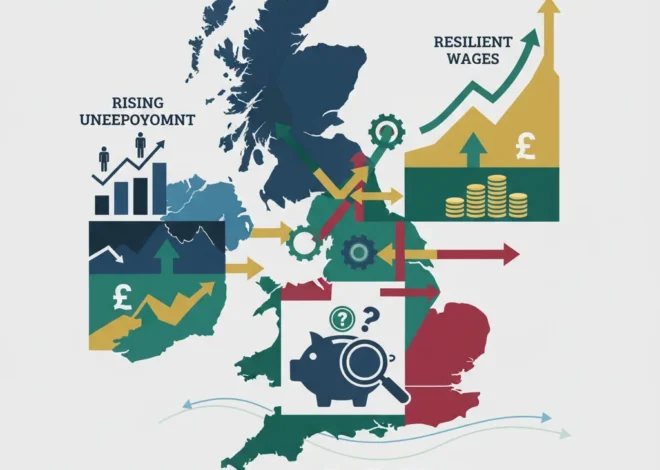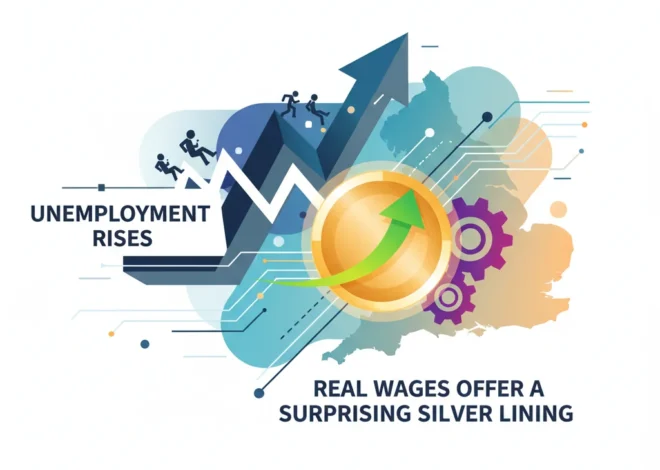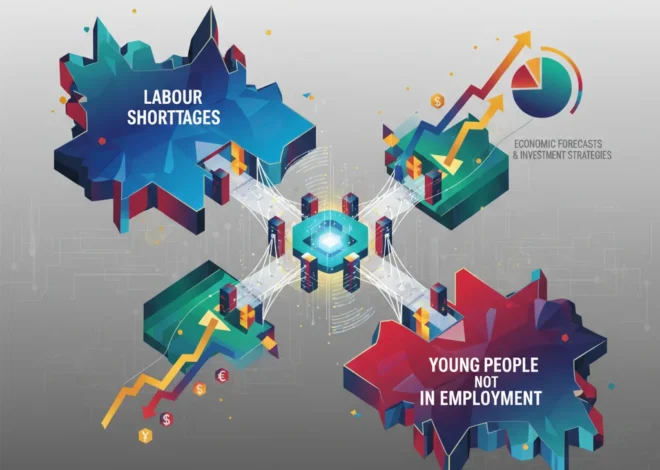
Beyond the Hype: How AI Is Quietly Reshaping the UK Job Market
We’ve all seen the headlines. “AI is coming for our jobs!” For years, it’s been a distant, almost sci-fi threat. But what if I told you the shift is already here, happening faster than anyone predicted, and it’s not the jobs you might think?
Forget robot butlers and sentient supercomputers for a moment. The real revolution is quieter, happening in the cloud, powered by sophisticated software, and it’s already begun to reshape the very foundation of the UK’s labour market. A recent, eye-opening study by Adzuna and the Institute for Employment Studies (IES) has thrown a harsh spotlight on this transformation, revealing that millions of entry-level and customer-facing roles are disappearing at an alarming rate. This isn’t a future problem; it’s a present-day reality. And for developers, entrepreneurs, and anyone working in tech, it presents both a profound challenge and an unprecedented opportunity.
Let’s dive into what the data tells us, why artificial intelligence is the key driver, and what this means for the future of work in the UK and beyond.
The Vanishing Rung on the Career Ladder
The core finding of the study is stark: the demand for staff in roles that have traditionally been the gateway to a career is plummeting. These aren’t just low-skilled jobs; they are the “first jobs” for millions of people—the roles where you learn the basics of a professional environment, develop soft skills, and begin your climb.
The numbers paint a clear picture of this structural shift. Since before the pandemic, a period that coincides with the explosive growth in accessible AI and automation tools, the landscape has changed dramatically.
Here’s a breakdown of the decline in vacancies for some of the most common entry-level roles, according to the IES analysis:
| Job Category | Decline in Vacancies (Since pre-pandemic) |
|---|---|
| Receptionists, PAs, Office Managers | Over 40% |
| Sales & Customer Service | Approximately 33% |
| General “Entry-Level” Roles | Approximately 25% |
What makes this so significant is that it’s happening during a period of a relatively tight labour market. This isn’t a simple recessionary dip; it’s a fundamental rewiring of the economy. Tony Wilson, director at the IES, calls it a “hollowing out” of the jobs market (source). The roles that once formed the bedrock of the service economy are being eroded, not by economic downturns, but by technological innovation.
The £4 Million Tweet: Deconstructing the Twitter Hack and the New Era of AI-Driven Cybersecurity
The Engine of Change: AI, SaaS, and the Cloud
So, what’s behind this dramatic shift? The answer lies in the convergence of powerful, accessible, and affordable technology. The rise of generative AI, exemplified by models like ChatGPT, has captured the public imagination, but the real impact comes from its integration into everyday business software.
Think about the roles in the table above:
- Customer Service: For years, this was a human-centric field. Today, AI-powered chatbots handle the majority of initial queries. Sophisticated machine learning algorithms can analyze customer sentiment in emails and route them automatically, often generating a perfect response without human intervention.
- Administration: AI assistants can now schedule meetings, transcribe notes, summarize long documents, and manage calendars with terrifying efficiency. The traditional role of a personal assistant or office manager is being systematically deconstructed by a suite of cloud-based tools.
– Sales: Modern CRM platforms, often delivered as SaaS (Software as a Service), use AI to score leads, predict customer churn, and even automate outreach campaigns. This allows a smaller sales team to be far more effective, reducing the need for entry-level sales development representatives.
This isn’t just a phenomenon for large corporations. The beauty—and disruptive power—of the SaaS model is that it makes cutting-edge automation available to startups and small businesses for a low monthly fee. A five-person startup can now deploy a customer service AI that rivals that of a multinational corporation, leveling the playing field and accelerating the displacement of these traditional roles.
The Great Divide: A Tale of Two Labour Markets
While one part of the job market is contracting, another is booming. The same technological forces dismantling administrative and sales roles are creating immense demand in others. The report notes that demand remains incredibly high in sectors like healthcare, social care, and construction—fields that require a high degree of physical presence, empathy, and complex problem-solving that AI can’t yet replicate.
And, of course, there’s the tech sector itself. The demand for talent that can build, manage, and secure these new AI systems is exploding. This includes roles like:
- AI/Machine Learning Engineers: The architects of the new economy.
- Data Scientists: Those who can interpret the vast amounts of data these systems generate.
- Cloud Architects: Specialists who design the resilient, scalable infrastructure that powers modern AI.
- Cybersecurity Experts: As automation increases, so does the attack surface. Protecting these interconnected systems is a top priority, making cybersecurity one of the fastest-growing fields.
- Software Developers: The need for skilled programming professionals to build the next generation of applications and integrate AI into existing workflows has never been higher.
This creates a dangerous bifurcation in the labour market. On one side, we have a shrinking pool of low-barrier-to-entry jobs. On the other, a rapidly growing pool of high-skill, high-wage jobs that require significant education and training. The bridge between these two worlds is weak, and that’s the central challenge we face.
The UK's Risky Gamble: Will Banning Ransomware Payments Save Us or Sink Us?
The Startup Imperative: Navigating the New Reality
For entrepreneurs and startups, this new landscape is a double-edged sword.
The Opportunity: Never before has it been possible to build such a lean, efficient, and powerful organization from day one. By leveraging AI-driven SaaS tools, startups can automate marketing, sales, customer support, and operations, allowing them to focus their limited human resources on core innovation and product development. This is a massive competitive advantage against slower-moving, legacy corporations.
The Challenge: As your startup grows, finding the right talent becomes more complex. You don’t just need a “salesperson”; you need someone who can manage an AI-augmented sales process. You don’t just need a “marketer”; you need someone who can orchestrate a complex web of automated campaigns while providing the creative human oversight that makes them effective.
The successful startups of tomorrow will be those that view AI not as a replacement for people, but as a force multiplier. The goal shouldn’t be to minimize headcount but to maximize human potential. This means investing in continuous training, fostering a culture of adaptability, and building teams where human creativity is augmented, not supplanted, by machine learning.
The Path Forward: Reskilling Is the New Recruiting
The trends highlighted in the FT article are not a temporary blip; they are the early tremors of a seismic economic shift. Ignoring them is not an option. So, what’s the way forward?
- For Individuals: The era of “learning a trade” and coasting for 40 years is over. Continuous learning is now a fundamental requirement for career stability. This means not only acquiring technical skills (like programming or data analysis) but also doubling down on uniquely human skills: critical thinking, creativity, complex communication, and emotional intelligence. Learning to use AI tools effectively is no longer optional; it’s a core competency.
- For Businesses: The focus must shift from simply hiring for existing skills to building a workforce capable of adapting to future needs. This means robust internal training programs, apprenticeships, and a culture that encourages reskilling. The war for talent won’t just be about finding people with the right skills; it will be about finding people with the ability to learn new ones.
- For the Tech Industry: We have a profound responsibility. We are building the tools that are reshaping society. This requires a focus on creating human-centric AI that augments and empowers workers, not just replaces them. It also means building intuitive tools that help bridge the skills gap, making the power of artificial intelligence accessible to everyone.
The hollowing out of the UK job market is a warning. But within that warning lies a call to action. The future of work isn’t about humans versus machines. It’s about humans *with* machines. The companies, individuals, and nations that embrace this collaborative future—investing in skills, fostering innovation, and managing the transition with empathy—are the ones who will thrive in the age of AI.
The AI Elephant in the Room: Why Google's CEO Is Warning You to Be Skeptical


